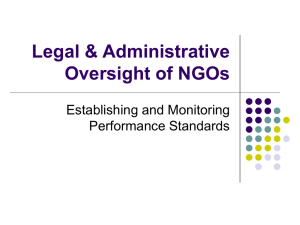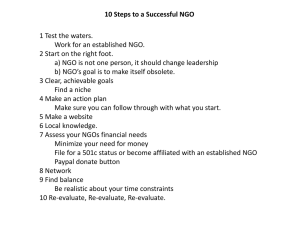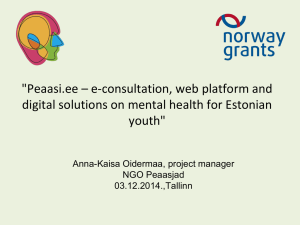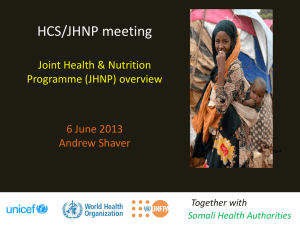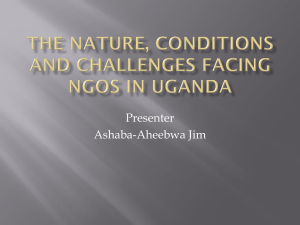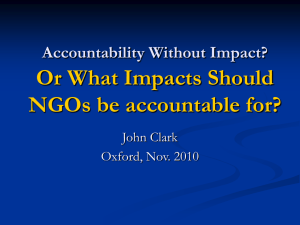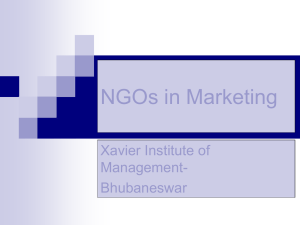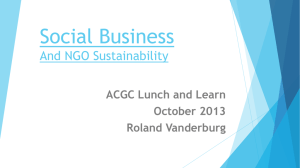PhD Up-Date for INDIGO Day June 7th 2011
advertisement
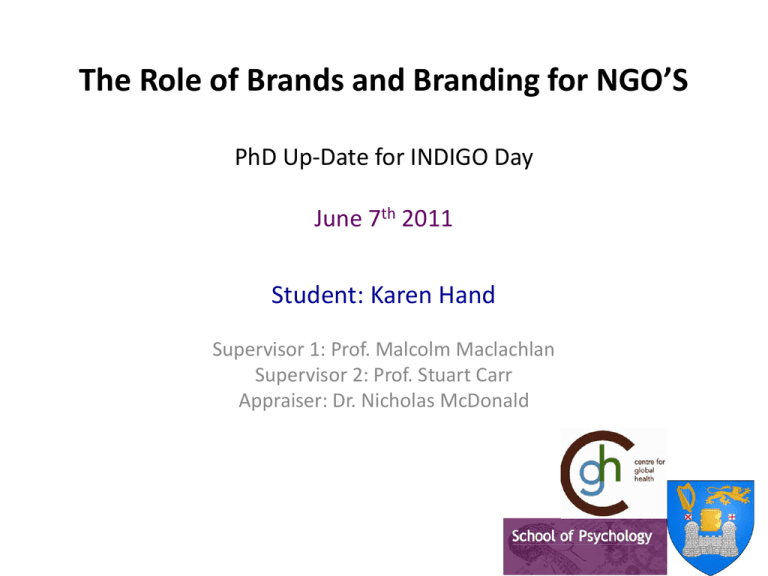
The Role of Brands and Branding for NGO’S PhD Up-Date for INDIGO Day June 7th 2011 Student: Karen Hand Supervisor 1: Prof. Malcolm Maclachlan Supervisor 2: Prof. Stuart Carr Appraiser: Dr. Nicholas McDonald Contents • Background – NGO’s in Brief – Potential roles for Brands in NGO’s • Research Question – Overall – Study 1 – (Subsequent Studies) • Research Design – Study 1 – 3 Case Studies – Triangulation of Data Sources • Any input or questions? NGO’s in Brief • NGO’s have played a growing role in development since World World II (Werker & Ahmed 2007) • More than 20,000 NGO’s in development space – (Union of International Organisations, 2005) • Defined by the World Bank (Operative Directive 47) as – private organizations “characterized primarily by humanitarian or cooperative, rather than commercial, objectives… that pursue activities to relieve suffering, promote the interests of the poor, protect the environment, provide basic social services, or undertake community development” • Recent Critiques of NGO centre on ‘accountability’ – To Donors? (e.g DIFID 2011) – To Recipients? (e.g Wallace, Bornstein & Chapman 2007) – To ‘Shared Value’? (Porter 2011) Potential Global ‘Donors’ E.G Donors of Food Aid (US $M) © Copyright 2006 SSAI Group (University of Sheffield ) and Mark Newman (University of Michigan) ‘Potential’ Global Recipients E.g : Living on US $10 to US $20 a Day © Copyright 2006 SSAI Group (University of Sheffield ) and Mark Newman (University of Michigan) Difficulty of Measuring NGO ‘success’ • Separation of ‘donor’ and ‘recipient’ as entities • Separation of time/location of donation and time /location or recipients • ‘Weighting’ of different stakeholders – Global Fund vs. children ‘at risk’ of hunger • Deliberate absence of ‘profit-motive’ can allow collective inefficiency or individual opportunism The Role of Nonprofit Enterprise : Henry B. Hansmann, The Yale Law Journal, Vol. 89, No. 5 (Apr., 1980), pp. 835-901 Accountability as ‘Shared Value’? Can the ‘shared value’ model be applied to NGO effectiveness? ‘Governments and NGOs often assume that trade-offs between economic and social benefits are inevitable, exacerbating these trade-offs through their approaches’. (Michael Porter , HBR, 2011, pg 11) Potential Role of Brands for NGO’s? • Self-focused – To promote the NGO agenda to donors and secure funds • Ritchie et al 1998 – To promote the NGO ‘values’ to itself and outwards • Stride, 2006 – To survive /grow versus others • Levine 2009 • System –focused – To harness help outside themselves • McLeod Grant & Crutchfield (2007) – To help drive solutions around ‘shared value’ • Porter 2011 – To help drive universal values around ‘common purpose’ • Lakoff 2008 • Crompton 2010 • Darnton & Kirk 2011 At the heart of these debates lies the tension between competition and collaboration , between self-interest and common purpose Research Question (s) Overall – Are NGO’s representing the change they want to see (in the world)? Study 1 – How do NGO’s currently understand and apply brands with their key stakeholders? Subsequent Studies – Possibly lab-based experiments or web-based simulations based on specific hypotheses arising from Study 1 Study 1 - Design • 3 Case Studies with NGO’s • Proposed Sample: Concern, Oxfam and the International Red Cross • Sample Rationale – brands with high public awareness in domestic/international arena • Proposed Theoretical Framework – Grounded Theory (Glaser & Strauss, 1967) • Proposed Methodology – ‘Triangulation’ of Data Sources within three case studies – Internal document/external comms review – sample list attached – Internal Interviews (minimum 5 per NGO) – ‘snowball’ recruitment – Internal Survey (minimum 30 respondents per NGO) – ‘snowball’ recruitment Study 1 – Design Internal Documents /External Comms Review Internal Documents /External Comms Review International Red Cross Internal Interviews Internal Documents /External Comms Review Internal Survey Concern Internal Interviews Oxfam Internal Survey Internal Interviews Internal Survey Concern- Homepage – Word Cloud Retrieved May 2011 - khand Oxfam - Homepage – Word Cloud Retrieved May 2011 - khand International Red Cross – Homepage –Word Cloud. Retrieved May 2011 - khand Prong 1. Request for Relevant NGO Literature 1 2 Key ‘Must-See’ documents to explain the essence of what this NGO is about and does – could include missions, charters, historical books/papers and media archives, films, radio broadcasts etc Some key examples of programmes /activities with ‘typify’ this particular NGO and what makes it different than others in either focus or approach. 1 3 4 5 Any documents or practices that refer to brands and branding within this NGO. Any concrete examples of how the brand fits within this NGO’s objectives? How does the brand and branding fit within this NGO’s programmes and activities? How does it fit within this NGO’s people strategy and practices? (If it doesn’t – why doesn’t it?) Some key examples of campaigns or communications which typify this NGO’s approach to key stakeholders 1 2 3 4 5 6 7 8 6 (This could include in field, fundraising, advocacy, partnership, internal activities etc) external –donor countries external – recipient countries external – donor bodies external – other international organizations external – other local organizations internal – head office internal – field offices Other If there is an organizational map/diagram of the NGO – where does the primary /secondary responsibility for the brand lie? 1 - ideally draw on a copy of the organization map Prong 2 – Internal Interviews - Schedule • History of NGO – the journey to here • ‘Typical’ behaviour (s) of this NGO (vs. others) • How ‘brand’ fits /doesn’t fit with NGO goals? – By stakeholder type: internal, external, systemic • How ‘branding’ is used with different stakeholders? • What sums NGO’s up? Non-verbal photo sort • What sums ‘brands’ up? Non verbal photo-sort • What do NGO’s and brands have in common (if anything)? Prong 2 – Internal Interviews – Schedule contd. • Possible conflicts with this NGO at present? – E.g getting funds versus spending funds – Serving agendas vs. setting agendas – Competition vs. collaboration • How this NGO is dealing with these conflicts? • What role does brand have within these conflicts? • If you were trying to solve a social/global problem tomorrow – would you start an NGO? – What role, if any, would ‘brand’ play? Prong 3. Internal Survey – Key Elements • Length of Service in this NGO • Role in this NGO • Personal View on Key Factors for this NGO’s success (5-point) – – – – – – – – – – Running effective programmes on the ground Using scientific evidence to make programme decisions Lobbying effectively to funding bodies Building awareness of X with the general public in donor countries Building awareness of X with the general public in recipient countries Building awareness of the need for action in developing countries with the general public in donor countries Advocacy on specific X priority issues Strong internal leadership Good employee incentives Other (write in) • Personal View on each Other Stakeholders Views of this NGO’s success (as above) -5 –point scale Case Study Analysis – Framework – Yin (2000) TYPE OF RIVAL Description or Examples Craft Rivals 1. The Null Hypothesis Observation is due to ‘chance’ 2. Threats to Validity E.G history, maturation, instumentation, regression etc 3. Investigator Bias ‘Experimenter effect’, reactivity in field research Real-Life Rivals 4. Direct Rival (Practice or Policy) An intervention other than ‘the intervention’ (‘the butler did it’) 5. Commingled Rival (Practice or Policy) Other interventions contributed to the results (‘wasn’t only me’) 6. Implementation Rival The process vs. the ‘intervention’ (‘did we do it right?’ ) 7. Rival Theory A theory different /better than the previous theory (‘elementary dear Watson’ ) 8. Super Rival A force bigger than us, including us’ (it’s bigger than both of us’ ) 9. Societal Rival Social trends , not a specific intervention (‘the times they are a changin’) Proposed Next Steps • Research Design /Details currently with Ethics Committee in Trinity School of Psychology – Feedback due end June 2011 • Presentation at INDIGO Day – June 7th 2011 • Contact Relevant NGO’s and Proceed with Case Studies – July – September 2011 Many Thanks Any input or questions? The Role of Brands and Branding for NGO’S PhD Up-Date for INDIGO Day June 7th 2011 Student: Karen Hand Supervisor 1: Prof. Malcolm Maclachlan Supervisor 2 : Prof. Stuart Carr. Appraiser : Dr. Nicholas McDonald
